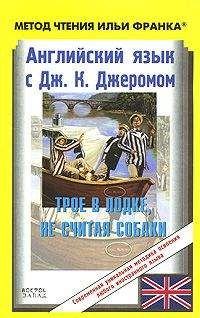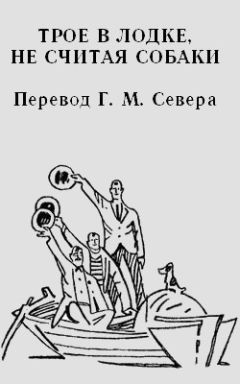Jerome Jerome - Английский язык с Джеромом К. Джеромом. Трое в лодке, не считая собаки
irregular [ɪˈreɡjulǝ] weird [wɪǝd] honour [ˈɔnǝ] bronchitis [brɔŋˈkaɪtɪs] drought [drɔ:t] rheumatic [ru(:)ˈmætɪk]
There was a boy at our school, we used to call him Sandford and Merton. His real name was Stivvings. He was the most extraordinary lad I ever came across. I believe he really liked study. He used to get into awful rows for sitting up in bed and reading Greek; and as for French irregular verbs there was simply no keeping him away from them. He was full of weird and unnatural notions about being a credit to his parents and an honour to the school; and he yearned to win prizes, and grow up and be a clever man, and had all those sorts of weak-minded ideas. I never knew such a strange creature, yet harmless, mind you, as the babe unborn.
Well, that boy used to get ill about twice a week, so that he couldn't go to school. There never was such a boy to get ill as that Sandford and Merton. If there was any known disease going within ten miles of him, he had it, and had it badly. He would take bronchitis in the dog-days, and have hay-fever at Christmas. After a six weeks' period of drought, he would be stricken down with rheumatic fever; and he would go out in a November fog and come home with a sunstroke.
They put him under laughing-gas one year, poor lad (его усыпили веселящим газом: «положили под газ» в каком-то году, беднягу), and drew all his teeth, and gave him a false set (и вырвали все его зубы, и поставили ему искусственные челюсти; to draw a tooth; false — неверный, фальшивый; set — комплект, набор), because he suffered so terribly with toothache (потому что он так ужасно страдал от зубной боли); and then it turned to neuralgia and ear-ache (потом она сменилась невралгией и ушной болью; to turn to — превращаться). He was never without a cold, except once for nine weeks while he had scarlet fever (он никогда не был без простуды, кроме /однажды/ девяти недель, пока болел скарлатиной); and he always had chilblains (и у него всегда были обморожения). During the great cholera scare of 1871 (во время большой холерной эпидемии 1871 года; scare — внезапный испуг; паника), our neighbourhood was singularly free from it (наша местность была необычно свободной от нее = нашу округу болезнь совсем не затронула). There was only one reputed case in the whole parish (был лишь один известный случай во всем приходе): that case was young Stivvings (молодой Стиввингс).
He had to stop in bed when he was ill (ему приходилось оставаться в постели, когда он болел), and eat chicken and custards and hot-house grapes (и есть цыплят, и пудинги, и виноград из оранжереи; custard — жидкий заварной крем /подается к пудингам, пирогам с фруктами и т.д./); and he would lie there and sob, because they wouldn't let him do Latin exercises (а он лежал и рыдал, потому что ему не позволяют делать латинские упражнения), and took his German grammar away from him (и забирали у него немецкую грамматику).
false [fɔ:ls] toothache [ˈtu:Ɵeɪk] chilblain [ˈʧɪlbleɪn] cholera [ˈkɔlǝrǝ] reputed [rɪˈpju:tɪd]
They put him under laughing-gas one year, poor lad, and drew all his teeth, and gave him a false set, because he suffered so terribly with toothache; and then it turned to neuralgia and ear-ache. He was never without a cold, except once for nine weeks while he had scarlet fever; and he always had chilblains. During the great cholera scare of 1871, our neighbourhood was singularly free from it. There was only one reputed case in the whole parish: that case was young Stivvings.
He had to stop in bed when he was ill, and eat chicken and custards and hot-house grapes; and he would lie there and sob, because they wouldn't let him do Latin exercises, and took his German grammar away from him.
And we other boys, who would have sacrificed ten terms of our school-life for the sake of being ill for a day (а мы, другие мальчишки, которые пожертвовали бы десять четвертей нашей школьной жизни ради того, чтобы проболеть один день; term — срок, определенный период; семестр, триместр), and had no desire whatever to give our parents any excuse for being stuck-up about us (и не имели никакого желания давать нашим родителям повод гордиться нами; stuck-up — высокомерный, самодовольный), couldn't catch so much as a stiff neck (не могли даже застудить шею; stiff neck — кривошея; stiff — жесткий, негибкий). We fooled about in draughts (мы играли на сквозняке; to fool about — играть, забавляться; дурачиться), and it did us good, and freshened us up (и это приносило нам пользу, и освежало нас); and we took things to make us sick, and they made us fat, and gave us an appetite (и мы ели /разные/ вещи, чтобы заболеть, и они делали нас жирными и давали аппетит = от них мы жирели и приобретали аппетит). Nothing we could think of seemed to make us ill until the holidays began (ничего /из того, что/ мы могли придумать, казалось, не приводило к болезни, пока не начинались каникулы; to begin). Then, on the breaking-up day, we caught colds (тогда, в день окончания занятий, мы схватывали простуду; break-up — распад; роспуск, прекращение занятий в школе; to catch — ловить, поймать), and whooping cough, and all kinds of disorders (и коклюш, и всевозможные болезни; whooping cough: to whoop — выкрикивать, кричать; сильно кашлять; cough — кашель), which lasted till the term recommenced (которые продолжались, пока не возобновлялись занятия); when, in spite of everything we could manoeuvre to the contrary (когда, несмотря на все, что мы предпринимали = несмотря на все ухищрения; to manoeuvre — маневрировать, добиваться ловкостью; to the contrary — наоборот), we would get suddenly well again, and be better than ever (мы внезапно снова выздоравливали и чувствовали себя лучше, чем когда-либо).
Such is life (такова жизнь); and we are but as grass that is cut down (а мы —всего лишь словно трава, которую срезают), and put into the oven and baked (и кладут в печь, и жгут; to bake — печь/ся/, запекать).
sacrificed [ˈsækrɪfaɪst] cough [kɔf] manoeuvre [mǝˈnu:vǝ]
And we other boys, who would have sacrificed ten terms of our school-life for the sake of being ill for a day, and had no desire whatever to give our parents any excuse for being stuck-up about us, couldn't catch so much as a stiff neck. We fooled about in draughts, and it did us good, and freshened us up; and we took things to make us sick, and they made us fat, and gave us an appetite. Nothing we could think of seemed to make us ill until the holidays began. Then, on the breaking-up day, we caught colds, and whooping cough, and all kinds of disorders, which lasted till the term recommenced; when, in spite of everything we could manoeuvre to the contrary, we would get suddenly well again, and be better than ever.
Such is life; and we are but as grass that is cut down, and put into the oven and baked.
To go back to the carved-oak question (возвращаясь к вопросу о резном дубе), they must have had very fair notions of the artistic and the beautiful, our great-great-grandfathers (/следует отметить, что/ они, должно быть, обладали очень развитыми представлениями о художественном и красивом = чувством изящного и прекрасного, наши предки: «прапрадеды»). Why, all our art treasures of to-day are only the dug-up commonplaces of three or four hundred years ago (ведь все наши сегодняшние сокровища искусства — всего лишь повседневные вещи: «откопанные банальности», /бывшие в употреблении/ три-четыре сотни лет назад; to dig — копать). I wonder if there is real intrinsic beauty in the old soup-plates (интересно, присуща ли истинная красота тарелкам для супа; soup-plate — глубокая тарелка; intrinsic — внутренний, присущий, свойственный), beer-mugs, and candle-snuffers that we prize so now (пивным кружкам и щипцам для снятия нагара со свечей, которые мы так высоко ценим сейчас; candle — свеча; to snuff — вдыхать, нюхать табак; снимать нагар /со свечи/), or if it is only the halo of age glowing around them (или это только сияние древности вокруг них; halo — ореол, сияние; age — возраст; век, эпоха; to glow — светиться, пылать, сверкать) that gives them their charms in our eyes (придает им прелесть в наших глазах; charm — шарм, обаяние, привлекательность). The "old blue" that we hang about our walls as ornaments (старинные голубые /тарелки/, что мы вешаем на стены в качестве украшения; ornament — орнамент, украшение) were the common every-day household utensils of a few centuries ago (были обычными повседневными предметами домашнего обихода несколько столетий назад; household — домашнее хозяйство; utensil — посуда, утварь, принадлежность); and the pink shepherds and the yellow shepherdesses (а розовые пастухи и желтые пастушки) that we hand round now for all our friends to gush over (которых мы показываем всем нашим друзьям, а те восторгаются; to hand round — раздавать; передавать по кругу; to gush — хлынуть; изливать чувства), and pretend they understand (и делают вид, /будто/ понимают), were the unvalued mantel-ornaments that the mother of the eighteenth century would have given the baby to suck when he cried (были неценимыми = обычными каминными украшениями, которые мать восемнадцатого века давала ребенку пососать, когда он плакал; to value — ценить; mantel — каминная полка; baby — ребенок; младенец).
beautiful [ˈbju:tɪf(ǝ)l] treasure [ˈtreʒǝ] ornament [ˈɔ:nǝmǝnt] utensil [ju(:)ˈtensl]
To go back to the carved-oak question, they must have had very fair notions of the artistic and the beautiful, our great-great-grandfathers. Why, all our art treasures of to-day are only the dug-up commonplaces of three or four hundred years ago. I wonder if there is real intrinsic beauty in the old soup-plates, beer-mugs, and candle-snuffers that we prize so now, or if it is only the halo of age glowing around them that gives them their charms in our eyes. The "old blue" that we hang about our walls as ornaments were the common every-day household utensils of a few centuries ago; and the pink shepherds and the yellow shepherdesses that we hand round now for all our friends to gush over, and pretend they understand, were the unvalued mantel-ornaments that the mother of the eighteenth century would have given the baby to suck when he cried.
Will it be the same in the future (будет ли то же самое в будущем)? Will the prized treasures of to-day always be the cheap trifles of the day before (будут ли всегда высоко ценимыми сегодняшними сокровищами дешевые безделушки прошлого; trifle — пустяк, мелочь; безделушка)? Will rows of our willow-pattern dinner-plates be ranged above the chimneypieces (будут ли ряды наших мелких тарелок с трафаретным китайским рисунком расставляться на каминных полках; willow-pattern — трафаретный синий китайский рисунок на белом фарфоре; willow — ива; pattern — рисунок, узор; dinner — обед; chimney — дымовая труба, дымоход) of the great in the years 2000 and odd (вельмож двадцать первого столетия; the great — богачи; вельможи; сильные мира сего; odd — лишний, добавочный /twenty odd years — двадцать с лишним лет/)? Will the white cups with the gold rim (будут ли белые чашки с золотым ободком) and the beautiful gold flower inside species unknown (и прекрасным золотым цветком неизвестного вида внутри), that our Sarah Janes now break in sheer light-heartedness of spirit (которые наши горничные разбивают без всякого огорчения; sheer — абсолютный, полнейший; light-hearted — беззаботный, беспечный), be carefully mended, and stood upon a bracket (аккуратно склеены и поставлены на полки; to mend — чинить, ремонтировать; штопать; to stand; bracket — держатель; небольшая полочка /на стене/), and dusted only by the lady of the house (а стирать пыль /с них/ будет лишь хозяйка дома; dust — пыль)?



